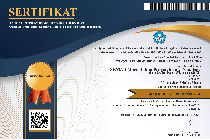Pengenalan Aplikasi Elektronika Berbasis Android di Madrasah Aliyah Negeri 1 (MAN) Grobogan
Abstract
Abstract
The rapid development of science and technology in recent years has greatly affected the teaching and learning process, especially physics lessons in high school. One of the technology products that has been widely used in all levels of society, including by students both at the elementary level to universities, is the smartphone. This community service activity is intended to increase the knowledge and skills of high school students in using smartphones with the Android operating system in a more effective, interactive, and fun learning process. This activity is carried out through training with theoretical presentation methods, practice, and discussion (question and answer). Direct practice is carried out using electronic media in smartphones owned by each participant (student). The practice used Android to create simple programs with the koltin programming language. Kotlin programming language was chosen because it is simpler, safer, and more productive than other programming languages, especially in the context of Android application development. From the discussion at the end of the training, it was concluded that students' knowledge and interest related to Android applications in learning are increasing because learning is done with easy, interactive, and fun methods. In addition, there is a growing interest of the students to continue their studies in college, especially in S1 Physics FMIPA UNS.
Keywords: Android, Kotlin, Learning, Student
Univer
Full Text:
PDFReferences
Arsyad, A. (2015) Media Pembelajaran. Jakarta: PT Raja Grafindo Persada.
Bhardwaj, S., Chauhan, P., & Sharma, R. Sharma, P. (2013). Android operating systems. International Journal of Engineering Technology and Management Research, 1(1), 147-150.
Krajci, I., Cummings, D., Krajci, I., & Cummings, D. (2013). History and Evolution of the Android OS. Android on x86: An Introduction to Optimizing for Intel® Architecture, 1-8. doi: 10.1007/978-1-4302-6131-5_1.
Farooqa, H., Zekavatb, P. R., & Moon, S. (2017). While loop algorithm to enhance the efficiency of Work sampling method in performance measurement. In ISARC. Proceedings of the International Symposium on Automation and Robotics in Construction (Vol. 34). IAARC Publications.
Foti, M. K., & Mendez, J. (2014). Mobile learning: How students use mobile devices to support learning. Journal of Literacy and Technology, 15(3), 58-78.
Geist, E. (2011). The game changer: Using iPads in college teacher education classes. College Student Journal, 45(4).
Gilski, P., & Stefanski, J. (2015). Android os: A review. Tem Journal, 4(1), 116.
Horton, J. (2019). Android Programming with Kotlin for Beginners: Build Android apps starting from zero programming experience with the new Kotlin programming language. Packt Publishing Ltd.
Marlinda, L. (2015). Pengaruh CD Education dan Animasi Berbasis Android Sebagai Alat Bantu Pembelajaran Untuk Meningkatkan Minat Belajar Siswa SMU IPA. Prosiding Simposium Nasional Inovasi dan Pembelajaran Sains.
Narmatha, M., & KrishnaKumar, S. V. (2016). Study on Android operating system and its versions. International Journal of Scientific Engineering and Applied Science (IJSEAS), 2(2), 439-444.
Radiansah, F., & Kuswanto, J. (2018). Media pembelajaran berbasis android pada mata pelajaran sistem operasi jaringan kelas XI. Jurnal Media Infotama, 14(1), 15-20. https://Doi.Org/10.37676/Jmi.V14i1.467.
Sikder, R., Khan, M. S., Hossain, M. S., & Khan, W. Z. (2020). A survey on android security: development and deployment hindrance and best practices. TELKOMNIKA (Telecommunication Computing Electronics and Control), 18(1), 485-499.
Schumacker, R. E. (1995). Math attitudes and achievement of Algebra I students: a comparative study of computer-assisted and traditional lecture methods of instruction. Computers in the Schools, 11(4), 27-33.
Uden, L., Wangsa, I. T., & Damiani, E. (2007). The future of E-learning: E-learning ecosystem. In 2007 inaugural IEEE-IES digital ecosystems and technologies conference (pp. 113-117). IEEE.
Wahyuningsih, D., & Makmur, R. (2017). E-learning Teori dan Aplikasi. Bandung: Informatika Bandung, 4.
Refbacks
- There are currently no refbacks.























